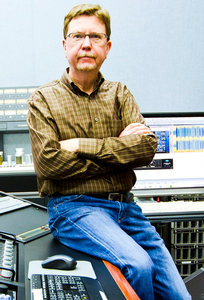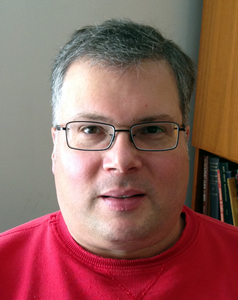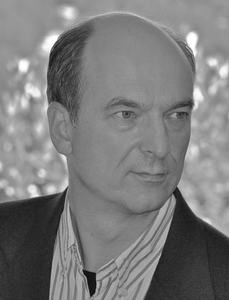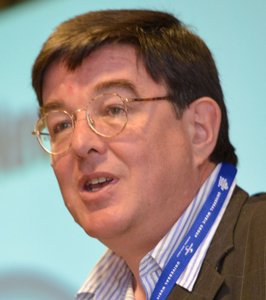AES New York 2017
Archiving and Restoration Track Event Details
Wednesday, October 18, 10:45 am — 12:15 pm (Rm 1E12)
Archiving & Restoration: AR01 - Get into the Groove: A Panel Discussion on Grooved Media
Chair:George Blood, George Blood Audio/Video/Film - Philadelphia, PA, USA
Moderator:
Rebecca Yuri Feynberg, New York University - New York, NY, USA
Panelists:
Peter Alyea, Library of Congress - Washington, D.C.
David Cawley, Timestep - Dartmouth, Devon, UK
Melissa Widzinski, Indiana University - Bloomington, IN, USA
A panel on grooved media. Grooved media comes in may forms, cylinders, records, Dictaphone recordings and other bizarre shapes and sizes. If it has grooves then this panel of experts should be able to help. There will be four short presentations featuring George Blood on The Great 78rpm Project; Peter Alyea on IRENE update; Melissa Widzinski on Field Cylinder Digitization at Indiana University and Dave Cawley on why All EQs are equal, but some EQs are more equal than others. There will be a 30 minutes question and answer session where you can field even the most awkward questions. Our panel of experts can advise on everything from stylus size, speeds, EQ, turntables, cylinder players, optical reconstruction and almost everything else. Beginners and old hands are all welcome.
George Blood: The Great 78rpm Project
The Great 78 Project is a community project for the preservation, research and discovery of 78rpm records. From about 1898 to the 1950s, an estimated 3 million sides (~3 minute recordings) were released on 78rpm discs. The Internet Archive is spearheading a project to digitize 400,000 sides to create a reference collection to make accessible a format that changed the way we experience sound recordings. George Blood, whose company is working on behalf of the Internet Archive, will describe the curation and technology behind the project, explain its goals, and discuss how others can contribute to the project.
Peter Alyea: IRENE update
The machine that's saving the history of recorded sound by allowing the playback of broken media. Peter Alyea, a digital conservation specialist at the Library of Congress presents an update on IRENE
Melissa Widzinski: Field Cylinder Digitization at Indiana University
As part of the Media Digitization and Preservation Initiative at Indiana University, the audio preservation team was tasked with digitally preserving approximately 7,000 wax cylinder recordings. The vast majority of these are field-recorded cylinders made between 1893 and 1938. This presentation will focus on how we digitize the cylinders, and the machine that we use to do so – the Endpoint Audio cylinder machine, designed by Nick Bergh.
Dave Cawley: All EQs are equal, but some EQs are more equal than others
Why EQs and Preamplifiers are not perfect and how to maximise your archival throughput. Dave Cawley talks about the how and why of equalisers (EQs) and preamplifiers. Why they matter, how they should operate, how they should "feel" and why they are such an important part of archiving.
 | This session is presented in association with the AES Technical Committee on Archiving Restoration and Digital Libraries |
Wednesday, October 18, 2:00 pm — 3:30 pm (Rm 1E07 (5.1))
Archiving & Restoration: AR02 - The Edison Kinetophone
Presenters:Jerry Fabris, Thomas Edison National Historical Park - West Orange, New Jersey, USA
Brad McCoy, Library of Congress - Culpeper, VA, USA
George Willeman, The Library of Congress - Culpeper, VA, USA
On February 17, 1913, Thomas A. Edison premiered his newest development in motion pictures—the Edison Kinetophone, a wonderful mechanical system for presenting talking pictures. Taking two of his most popular “inventions,” the phonograph and the motion picture, Edison’s engineers worked out a way to record live sound while simultaneously shooting film and then play back the two elements in sync. The Kinetophone was met with a standing ovation at the premiere and the showings went well for about two weeks. The downfall of the system was one of mechanical complexity and the reality that the human operator just could not keep the film and sound in sync. Although much time and development were put into the Kinetophone, within a year, production stopped and the system was quietly retired. Fast forward a century and with the collaboration of The Library of Congress and The Thomas Edison National Historical Park, the eight Kinetophones known to survive with both picture and sound have been reconstructed, using some of the newest digital applications for both picture and sound. The films now look better and sound better than they did even when they were new.
 | This session is presented in association with the AES Technical Committee on Archiving Restoration and Digital Libraries |
Wednesday, October 18, 3:45 pm — 5:15 pm (Rm 1E07 (5.1))
Archiving & Restoration: AR03 - Soundstream: The First Commercial Digital Audio Recording System
Presenter:Paul R. Blakemore, Concord Music Group - Cleveland, OH, USA
Paul Blakemore will present a workshop on the history of the Soundstream digital tape recording system including an overview of its operating principals, projects recorded with the system, and a playback demonstration of an original Soundstream master tape using a working Soundstream machine that dates from about 1980.
 | This session is presented in association with the AES Technical Committee on Archiving Restoration and Digital Libraries |
Thursday, October 19, 9:00 am — 10:00 am (Rm 1C03)
TC Meeting: Archiving Restoration and Digital Libraries
Technical Committee Meeting on Archiving Restoration and Digital Libraries
Thursday, October 19, 9:30 am — 11:00 am (Rm 1E15/16)
Special Event: AR04 - Bearing Witness: The Music of Star Wars—Archiving Art and Technology
Presenters:Leslie Ann Jones, Recording Engineer and Producer, Director of Music Recording and Scoring, Skywalker Sound - San Rafael, CA, USA
Dann Michael Thompson, Skywalker Sound - Nicasio, CA, USA
When Sony Classics requested original vinyl masters for a new release of Star Wars soundtracks that started us on a mission to archive and preserve all the music of Star Wars. A tour of the Lucasfilm archives made us realize we were looking at a 40-year history of film scoring and at some point in the near future some of this material could not be played or accessed for reuse. We will discuss the format choice, transfer process, database creation, and editing process. The goal? .... how to future-proof accessibility of some of the greatest film music of all time.
 | This session is presented in association with the AES Technical Committee on Archiving Restoration and Digital Libraries |
Thursday, October 19, 1:30 pm — 3:00 pm (Rm 1E14)
Archiving & Restoration: AR05 - Restoration Audio: Preservation of Your Assets Today for Tomorrow
Moderator:Bob Koszela, Iron Mountain Entertainment Services - Kennerdell, PA, USA
Panelists:
Bob Clearmountain, Apogee Electronics, Inc. - Santa Monica, CA, USA; Mix This! - Pacific Palisades, CA, USA
Kelly Pribble, Iron Mountain Entertainment Services
Andrew Scheps, Recording engineer - Van Nuys, CA, USA
Andy Skurow, Universal Music Group
Advancements in audio technology and tremendous changes in how the entertainment industry creates and monetizes content have challenged engineers to accommodate requests to migrate, mix, master, store, and distribute content securely. This panel addresses the challenges to restore degraded or damaged media assets including those affected by binder hydrolysis (sticky shed), tape binding adhesion (NOT sticky shed), mold, water damage, bent flanges, de-spooled pancake, salt residue, glue seep, splice repair, lubricant loss, static discharge, and acetate spoking to name a few. Moderated by Bob Koszela of Iron Mountain Entertainment Services Digital Studios (who preserves over 28 million assets for its customers), the panel will show examples of various types of degradation to a wide range of audio formats.
 | This session is presented in association with the AES Technical Committee on Archiving Restoration and Digital Libraries |
Friday, October 20, 9:00 am — 10:15 am (Rm 1E15/16)
Archiving & Restoration: AR06 - The Music Never Stopped: The Future of the Grateful Dead Experience in the Information Age—Part 1
Co-chairs:György Fazekas, Queen Mary University of London - London, UK
Thomas Wilmering, Queen Mary University of London - London, UK; Centre for Digital Music (C4DM)
Panelists:
Jeremy Berg, Cataloging Librarian, University of North Texas
Scott Carlson, Metadata Coordinator, Rice Fondren Library
Nicholas Meriwether, director, Center for Counterculture Studies, San Francisco
John Meyer, Meyer Sound Labs
Bryan Pardo, Northwestern University - Evanston, IL, USA
Ever since the advent of recording, technology has been constantly shaping the way we interact with music as well as the relationship between artists and fans. For instance, file compression and broadband internet disrupted conventional music distribution, creating new opportunities for the formation of online fan communities. A growing number of bands allow taping their live performances while there are expanding online archives, such as Etree and the Live Music Archive, for trading audio freely with permission between an increasing number of fans. The Grateful Dead and their fans the Deadheads bestow a prominent example with their innovative use of this technology. Semantic technologies are next in line, with a premise of step change in how we access audio archives. This workshop explores how semantic technologies provide enriched experiences for fans, greater exposure for bands and new opportunities for archives to flourish. We demonstrate new ways of navigating concert recordings, particularly those of the Grateful Dead, discuss opportunities and requirements with audio archivists and librarians, as well as the broader social and cultural context of how new technologies bear on music archiving and fandom.
 | This session is presented in association with the AES Technical Committee on Archiving Restoration and Digital Libraries |
Friday, October 20, 9:00 am — 10:30 am (Rm 1E09)
Archiving & Restoration: AR07 - The Past and Future of Archiving & Preservation
Presenters:Rebecca Yuri Feynberg, New York University - New York, NY, USA
George Massenburg, Schulich School of Music, McGill University - Montreal, Quebec, Canada; Centre for Interdisciplinary Research in Music Media and Technology (CIRMMT) - Montreal, Quebec, Canada
Brad McCoy, Library of Congress - Culpeper, VA, USA
Toby Seay, Drexel University - Philadelphia, PA, USA
Nadja Wallaszkovits, Phonogrammarchiv, Austrian Academy of Science - Vienna, Austria; NOA GmbH - Vienna, Austria
This session will address important issues in archiving and preservation including audio preservation and higher education, preservation of multichannel recordings for music and cinema, the process and procedures of archiving and preservation, and current work at the Library of Congress. The panelists will present issues that will be featured at the upcoming international AES conference on Audio Archiving Preservation and Restoration.
 | This session is presented in association with the AES Technical Committee on Archiving Restoration and Digital Libraries |
Friday, October 20, 4:30 pm — 6:00 pm (Rm 1E08)
Archiving & Restoration: AR08 - The Music Never Stopped: The Future of the Grateful Dead Experience in the Information Age—Part 2
Co-chairs:György Fazekas, Queen Mary University of London - London, UK
Thomas Wilmering, Queen Mary University of London - London, UK; Centre for Digital Music (C4DM)
Panelists:
Jeremy Berg, Cataloging Librarian, University of North Texas
Scott Carlson, Metadata Coordinator, Rice Fondren Library
Nicholas Meriwether, director, Center for Counterculture Studies, San Francisco
John Meyer, Meyer Sound Labs
Bryan Pardo, Northwestern University - Evanston, IL, USA
Ever since the advent of recording, technology has been constantly shaping the way we interact with music as well as the relationship between artists and fans. For instance, file compression and broadband internet disrupted conventional music distribution, creating new opportunities for the formation of online fan communities. A growing number of bands allow taping their live performances while there are expanding online archives, such as Etree and the Live Music Archive, for trading audio freely with permission between an increasing number of fans. The Grateful Dead and their fans the Deadheads bestow a prominent example with their innovative use of this technology. Semantic technologies are next in line, with a premise of step change in how we access audio archives. This workshop explores how semantic technologies provide enriched experiences for fans, greater exposure for bands and new opportunities for archives to flourish. We demonstrate new ways of navigating concert recordings, particularly those of the Grateful Dead, discuss opportunities and requirements with audio archivists and librarians, as well as the broader social and cultural context of how new technologies bear on music archiving and fandom.
 | This session is presented in association with the AES Technical Committee on Archiving Restoration and Digital Libraries |
Friday, October 20, 5:00 pm — 6:00 pm (Rm 1E10)
Archiving & Restoration: AR09 - The Roots of Stereophony
Presenter:Thomas Fine, (sole proprietor of private studio) - Brewster, NY, USA
A review of the roots and developments that led from 2-channel telephony in France and England in the late 1800s to the stereo LP in 1958. Reviewed will be key developments from Bell Labs, EMI/Blumlein, Magnetophone/German radio, Magnecord, Emory Cook and the beginnings of stereo recording by the major record labels. A brief examination of the related "aside" topic of "accidental stereo" recordings from the 78 era will also take place.
 | This session is presented in association with the AES Technical Committee on Archiving Restoration and Digital Libraries |
Saturday, October 21, 10:45 am — 12:15 pm (Rm 1E10)
Archiving & Restoration: AR10 - Tales of Asset Management: The Good, the Bad, and "v2_final_mix_master_VOX UP_FINAL.wav.aiff"
Moderator:Margaret Luthar, Chicago Mastering Service - Chicago, IL, USA
Panelists:
Adam Gonsalves, Telegraph Mastering - Portland, OR, USA
Paul Jessop, County Analytics Ltd - Dunstable, Bedfordshire, UK
Brian Losch, Freelance recording/mixing/post engineer - Brooklyn, NY, USA
Mark Yeend, Creative Director, ATG at Xbox at Microsoft
Whether you're a studio engineer or a location sound recordist - at some point, the work you do will be handed off to someone else. Not only is it important to be diligent in organization for one's own personal project management, but it is important when dealing with clients, labels, production houses, and last but not least, other audio engineers! In this event, we discuss the needs of individual branches of the audio world (film sound, game audio, interactions between the tracking engineer and mixing engineer, and mastering needs) as well as archival standards put forth by AES/EBU/NARAS. We will also discuss maintaining good written records while working, project workflow, and what is actually crucial to doing good work from start to finish. Whether you're a novice or a seasoned engineer, this workshop will help you learn good organizational routines — or break some bad habits (we all have them)!
 | This session is presented in association with the AES Technical Committee on Archiving Restoration and Digital Libraries |
Saturday, October 21, 10:45 am — 12:15 pm (Rm 1E08)
Archiving & Restoration: AR11 - 30th St. Studio
Presenter:Dan Mortensen, Dansound Inc. - Seattle, WA, USA
Chronological history of the studio from its construction as a church through its eras as a studio used to create many phenomenal sounding recordings in many musical genres by the country and world's leading musical, social, artistic, and theatrical artists. It was converted from a church in 1948 and demolished in 1982. The presenter has been researching the studio for the last 9 years and is in the midst of a long-term project to recreate the life of the studio with as much detail as can be found. CBS's chief recording engineer Fred Plaut was also a semi-professional photographer, and the presenter has scoured Fred's photographic archive of over 30,000 pictures to find those relevant to the studio and its occupants; many pictures from that collection will be in the presentation.
 | This session is presented in association with the AES Technical Committee on Archiving Restoration and Digital Libraries |
Saturday, October 21, 1:30 pm — 3:00 pm (Rm 1E14)
Archiving & Restoration: AR12 - Is There Life on MARS? Preservation Techniques for the 21st Century
Chair:Steve Rosenthal, MARS ( MagicShop Archive and Restoration Studios - Brooklyn, NY, USA
Moderator:
Rebecca Yuri Feynberg, New York University - New York, NY, USA
Panelists:
Wally De Backer (Gotye), Forgotten Futures - New York, NY, USA
Michael Graves
Nora Guthrie
Stephen Masucci
Alex Slohm, MARS ( MagicShop Archive and Restoration Studios
Regan Sommer McCoy, The Mixtape Museum - New York, NY, USA
Owner of the MagicShop and MARS Steve Rosenthal and his colleagues will present the work they have been doing with remastering and archiving significant, historical recordings from Lou Reed to Woody Guthrie. The presenters will describe their history and path as they moved forward from the MagicShop to the MagicShop Archive and Restoration Studios (MARS).
Wally De Backer (Gotye) and Stephen Masucci will present their collaborative work restoring the rare French proto-synthesizer, the Ondioline, and reviving the technical and historical documents published by the instrument's inventor Georges Jenny.
 | This session is presented in association with the AES Technical Committee on Archiving Restoration and Digital Libraries |
Saturday, October 21, 3:15 pm — 4:45 pm (Rm 1E14)
Archiving & Restoration: AR13 - New Developments in Studio Metadata
Presenter:Paul Jessop, County Analytics Ltd - Dunstable, Bedfordshire, UK
Responsibilities of studio experts now extend well beyond great sound into accurate data about the recordings they enable. This workshop will look at the evolution of standards, tools, expectations, and opportunities in the field and will bring together experts to discuss the whats, the ways, and the hows of collecting and providing studio metadata.
 | This session is presented in association with the AES Technical Committee on Archiving Restoration and Digital Libraries |




